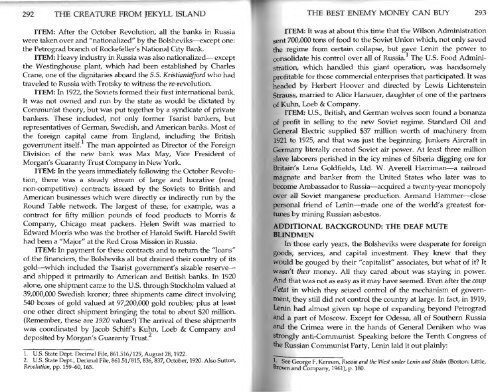You also want an ePaper? Increase the reach of your titles
YUMPU automatically turns print PDFs into web optimized ePapers that Google loves.
292 THE CREATURE FROM JEKYLL ISLAND<br />
ITEM: After the October Revolution, all the banks in Russia<br />
were taken over and "nationalized" by the Bolsheviks—except one:<br />
the Petrograd branch of Rockefeller's National City Bank.<br />
ITEM: Heavy industry in Russia was also nationalized— except<br />
the Westinghouse plant, which had been established by Charles<br />
Crane, one of the dignitaries aboard the S.S. Kristianiafjord who had<br />
traveled to Russia with Trotsky to witness the re-revolution.<br />
ITEM: In 1922, the Soviets formed their first international bank.<br />
It was not owned and run by the state as would be dictated by<br />
Communist theory, but was put together by a syndicate of private<br />
bankers. These included, not only former Tsarist bankers, but<br />
representatives of German, Swedish, and American banks. Most of<br />
the foreign capital came from England, including the British<br />
government itself. The man appointed as Director of the Foreign<br />
Division of the new bank was Max May, Vice President of<br />
Morgan's Guaranty Trust Company in New York.<br />
ITEM: In the years immediately following the October Revolution,<br />
there was a steady stream of large and lucrative (read<br />
non-competitive) contracts issued by the Soviets to British and<br />
American businesses which were directly or indirectly run by the<br />
Round Table network. The largest of these, for example, was a<br />
contract for fifty million pounds of food products to Morris &<br />
Company, Chicago meat packers. Helen Swift was married to<br />
Edward Morris who was the brother of Harold Swift Harold Swift<br />
had been a "Major" at the Red Cross Mission in Russia.<br />
ITEM: In payment for these contracts and to return the "loans"<br />
of the financiers, the Bolsheviks all but drained their country of its<br />
gold—which included the Tsarist government's sizable reserve—<br />
and shipped it primarily to American and British banks. In 1920<br />
alone, one shipment came to the U.S. through Stockholm valued at<br />
39,000,000 Swedish kroner; three shipments came direct involving<br />
540 boxes of gold valued at 97,200,000 gold roubles; plus at least<br />
one other direct shipment bringing the total to about $20 million.<br />
(Remember, these are 1 920 values!) The arrival of these shipments<br />
was coordinated by Jacob Schiff's Kuhn, Loeb & Company and<br />
deposited by Morgan's Guaranty Trust.<br />
1. U.S. State Dept. Decimal File, 861.516/129, August 28, 1922.<br />
2. U.S. State Dept., Decimal File, 861 .51 /815, 836, 837, October, 1920. Also Sutton,<br />
Revolution, pp. 159-60, 165.<br />
THE BEST ENEMY MONEY CAN BUY 293<br />
ITEM: It was at about this time that the Wilson Administration<br />
sent 700,000 tons of food to the Soviet Union which, not only saved<br />
the regime from certain collapse, but gave Lenin the power to<br />
consolidate his control over all of Russia. The U.S. Food Administration,<br />
which handled this giant operation, was handsomely<br />
profitable for those commercial enterprises that participated. It was<br />
headed by Herbert Hoover and directed by Lewis Lichtenstein<br />
Strauss, married to Alice Hanauer, daughter of one of the partners<br />
of Kuhn, Loeb & Company.<br />
ITEM: U.S., British, and German wolves soon found a bonanza<br />
of profit in selling to the new Soviet regime. Standard Oil and<br />
supplied $37 million worth of machinery from<br />
General Electric<br />
1921 to 1925, and that was just the beginning. Junkers Aircraft in<br />
Germany literally created Soviet air power. At least three million<br />
slave laborers perished in the icy mines of Siberia digging ore for<br />
Britain's Lena Goldfields, Ltd. W. Averell Harriman—a railroad<br />
magnate and banker from the United States who later was to<br />
become Ambassador to Russia—acquired a twenty-year monopoly<br />
over all<br />
personal<br />
Soviet manganese production. Armand Hammer—close<br />
friend of Lenin—made one of the world's greatest fortunes<br />
by mining Russian asbestos.<br />
ADDITIONAL BACKGROUND: THE DEAF MUTE<br />
BLINDMEN<br />
In those early years, the Bolsheviks were desperate for foreign<br />
goods, services, and capital investment. They knew that they<br />
would be gouged by their "capitalist" associates, but what of it? It<br />
wasn't their money. All they cared about was staying in power.<br />
And that was not as easy as it may have seemed. Even after the coup<br />
d'etat<br />
in which they seized control of the mechanism of government,<br />
they still did not control the country at large. In fact, in 1919,<br />
Lenin had almost given up hope of expanding beyond Petrograd<br />
and a part of Moscow. Except for Odessa, all of Southern Russia<br />
and the Crimea were in the hands of General Deniken who was<br />
strongly anti-Communist. Speaking before the Tenth Congress of<br />
the Russian Communist Party, Lenin laid it out plainly:<br />
1 See George F. Kennan, Russia and the West under Lenin and Stalin (Boston: Little,<br />
Brown and Company, 1961), p. 180.


